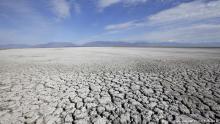Climate history
Scientists: Carbon dioxide must be removed from the atmosphere to avoid extreme climate change
Humans must start removing carbon dioxide from the atmosphere as soon as possible to avoid saddling future generations with a choice between extreme climate change or spending hundreds of trillions of dollars to avoid it, according to new research.
Europe's wine industry may suffer with global warming, research shows
Global warming may hit wine lovers where it hurts the most - the pocket - as rising temperatures are likely to increase labor costs in Europe's vineyards, researchers said on Thursday.
In the hills behind Cyprus's coastal city of Limassol, grape pickers work in average peak temperatures of 36 degrees Celsius (97 degrees F) in August, a month when much of the harvest is brought in.
Up to half of the Arctic’s melt might be totally natural
Scientists have known for a while that the Arctic is melting. The signs are everywhere—from the famed Alaskan Iditarod course being moved multiple times due to lack of snow, to the emergence of starving polar bears with nowhere to hunt.
But while scientists are certain that the Arctic is melting at an alarming rate, they aren’t really sure why.
‘Britain’s Atlantis’ found at bottom of the North sea
Doggerland was an area of land, now lying beneath the southern North Sea, that connected Great Britain to mainland Europe during and after the last Ice Age. It was then gradually flooded by rising sea levels around 6,500–6,200 BCE.
The climate issue in Turkey
Main opposition Republican People's Party (CHP) İzmir deputy Murat Bakan filed a parliamentary question the other day for Prime Minister Binali Yıldırım to ask why Turkey has not brought the Paris Agreement it has signed to parliament's general assembly. This was a timely parliamentary question while climate change continues to be the hottest subject in the world.
- Read more about The climate issue in Turkey
- Log in to post comments
Climate Changes Everything: Scientists
Carbon Dioxide
Although the Paris Agreement on Climate Change entered into force on November 4 (marking the first time that governments of different countries have agreed legally binding limits to global temperature rises), leading international scientists are still worried about global warming.
- Read more about Climate Changes Everything: Scientists
- Log in to post comments
2016 'very likely' hottest year on record: UN
The year 2016 will "very likely" be the hottest on record, the U.N. said Nov. 14, warning of calamitous consequences if the march of global warming cannot be halted.
- Read more about 2016 'very likely' hottest year on record: UN
- Log in to post comments
UN: 2016 hottest year on record
The UN reported this year to “very likely” be the hottest on record, making it the third consecutive year that record temperatures have been broken. It also noted that 16 of the 17 hottest years recorded have been this century.
- Read more about UN: 2016 hottest year on record
- Log in to post comments
Major environmental changes seen for Mediterranean: Study
Global warming is likely to change the environment of the Mediterranean region in ways unseen in the past 10,000 years, reshaping forests and turning parts of Europe into desert, researchers warned on Oct. 27.
The Mediterranean is known as a hotspot for biodiversity, and it is warming up fast.
Non-linear climate emergency
If you spend a lot of time talking to scientists about climate change, there's one word you'll hear time and time again, and yet it's hardly ever mentioned in the public discussion of climate change. The word is "non-linear."
- Read more about Non-linear climate emergency
- Log in to post comments







